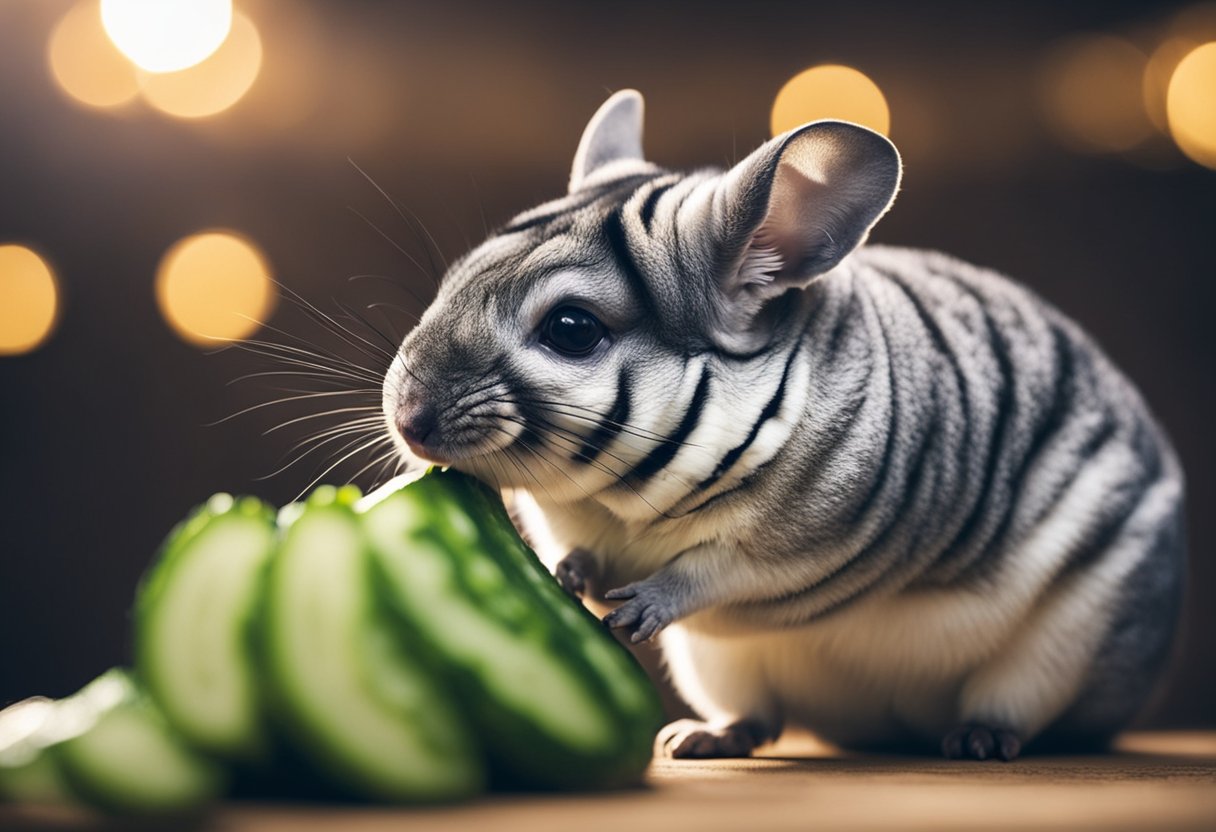Can Chinchillas Eat Cucumbers? Understanding Their Dietary Needs
Caring for a chinchilla means understanding what foods are safe and healthy for them. You may be wondering, can chinchillas eat cucumbers? While chinchillas can eat cucumbers, it should only be given in small amounts due to the high water content and low nutritional value. Cucumbers may seem like a refreshing snack, but they are not a staple in a chinchilla’s diet. So, can chinchillas eat cucumbers? Yes, but sparingly. Let’s explore more about how cucumbers fit into your furry friend’s meals and ensure you’re making the best dietary choices to keep them healthy.

Cucumbers are refreshing, but it is important to approach this vegetable with caution. While they are safe to eat, overfeeding can lead to digestive issues. In this article, you will learn how to assess cucumbers for your chinchilla and find tips on suitable portions to maintain their health.
Key Takeaways
- Chinchillas can safely eat cucumbers in moderation.
- Cucumbers should be a rare treat, not a regular part of the diet.
- Always prioritize the nutritional needs of your chinchilla when choosing foods.
Chinchilla Dietary Needs

Understanding what your chinchilla needs is crucial for maintaining their health. A balanced diet supports their growth, energy levels, and overall well-being.
Essential Nutrients for Chinchillas
Chinchillas require a diet high in fiber. Hay, especially timothy hay, should be the main component of their diet. It aids digestion and keeps their teeth healthy.
You should also include small amounts of pellets specifically designed for chinchillas, which provide essential vitamins and minerals. Fresh vegetables can be added occasionally, but be careful with water-rich foods like cucumbers, as they do not offer much nutritional value.
Key nutrients include:
- Fiber: 20-30% of their diet
- Protein: 15-20% from high-quality pellets
- Fat: Low levels, ideally under 5%
Risks of Improper Diet
Feeding your chinchilla an improper diet can lead to serious health issues. High sugar and fat intake can cause obesity and related problems.
Cucumbers, while safe in moderation, lack the necessary nutrients and can upset their digestive system if overfed. This can lead to diarrhea or other gastrointestinal issues.
Additionally, avoid foods high in sugar, such as fruits or treats not made for chinchillas. These can disrupt their digestive balance. Always monitor your pet’s health and consult a vet if you notice any changes due to diet.
Assessing Cucumbers for Chinchillas

When considering cucumbers for your chinchilla, it’s important to evaluate their nutritional value, possible benefits, concerns, and how often you can safely provide them. Understanding these factors will help ensure your pet’s health and well-being.
Cucumber Nutritional Profile
Cucumbers are composed mainly of water, with about 95-96% of their weight coming from water. This high moisture content can cause loose stools in chinchillas if consumed in large amounts.
While cucumbers contain some vitamins and minerals, they have limited nutritional value. They provide small amounts of vitamin K and potassium but lack essential nutrients that chinchillas need for a balanced diet.
Additionally, cucumbers contain natural sugars. Although this sugar content is low, any sugar should be limited in a chinchilla’s diet to prevent weight gain or digestive issues. Feeding cucumbers should be a supplemental choice, not a staple.
Benefits and Concerns of Feeding Cucumbers
Cucumbers can be refreshing and a fun treat for your chinchilla. They can add variety to your pet’s diet, helping to keep mealtime interesting. This can be especially useful if your chinchilla is hesitant to try other foods.
However, there are concerns about feeding cucumbers. Due to their high water content, excessive feeding can lead to diarrhea or digestive upset. It’s vital to introduce cucumbers slowly and watch for any adverse reactions.
In small amounts, they can offer hydration, but remember that they shouldn’t be the primary source of water or nutrition. Always prioritize hay and suitable pellets as the main components of your chinchilla’s diet.
Appropriate Serving Size and Frequency
When feeding cucumbers, moderation is key. A good guideline is to offer a small piece about the size of your chinchilla’s paw once a week. This helps prevent any negative effects related to their high water content.
Make sure to wash the cucumber thoroughly to remove any pesticide residues. You can slice it into small pieces to make it easier for your chinchilla to handle and eat.
If this is your chinchilla’s first time eating cucumber, start with an even smaller piece. Monitor your pet for any signs of gastrointestinal upset. Adjust the frequency based on how your chinchilla reacts.
Resources
To better understand the right diet for your chinchilla, consider reputable resources. Check out articles specifically discussing chinchilla diets and care from trusted websites.
You may find tips on safe vegetables and treats, as well as detailed nutritional information. Visiting vet hospital websites or forums can also provide community insights from other chinchilla owners. Always ensure that any information comes from credible sources that focus on chinchilla health and nutrition.
Frequently Asked Questions

Chinchilla owners often have questions about diet and safety when it comes to feeding their pets. Understanding which foods are appropriate will help keep your chinchilla healthy and happy. Here are some common inquiries regarding the diets of chinchillas.
What types of vegetables are safe for chinchillas to consume?
Chinchillas can safely eat a few specific vegetables. Some safe options include bell peppers and small amounts of zucchini. Always introduce new foods slowly and monitor your pet for any adverse reactions.
Are there any risks associated with feeding chinchillas cucumber seeds?
Cucumber seeds are generally not toxic to chinchillas. However, they can be difficult for them to digest. It is best to remove the seeds before offering cucumbers to avoid any potential digestive issues.
Which fruits should be avoided in a chinchilla’s diet?
Certain fruits are high in sugar and should be avoided. Avoid grapes, bananas, and other sugary fruits. These can lead to weight gain and other health problems in chinchillas.
Can feeding carrots to chinchillas cause any health issues?
Carrots are higher in sugar compared to other vegetables. Feeding too many carrots can lead to weight gain. It is advisable to provide them as an occasional treat rather than a regular part of their diet.
What are the potential dangers of giving lettuce to chinchillas?
Lettuce can cause digestive issues in chinchillas. Some types, especially iceberg lettuce, contain high water content and little nutritional value. This can lead to diarrhea and should be avoided.
Are there any vegetables that chinchillas should never eat?
Yes, chinchillas should never eat starchy vegetables like potatoes and corn. These can be harmful and lead to serious health concerns. Stick to safe vegetable options to ensure their well-being.

